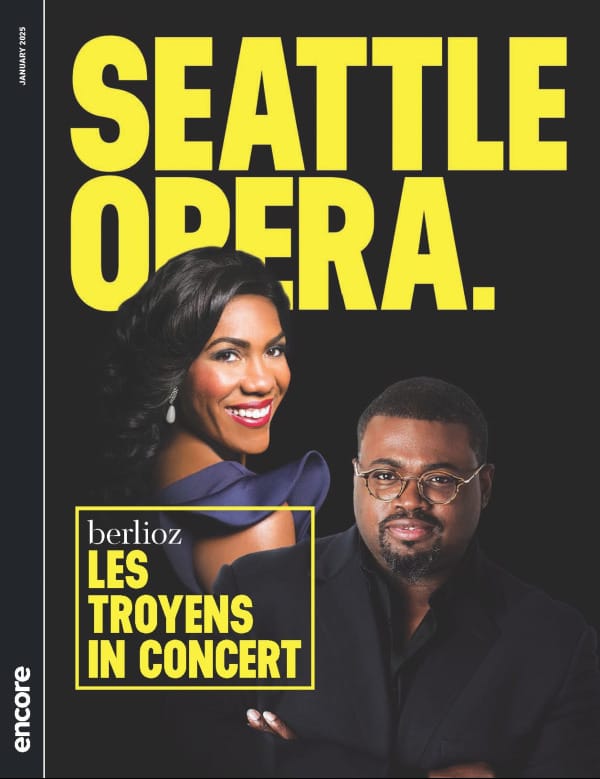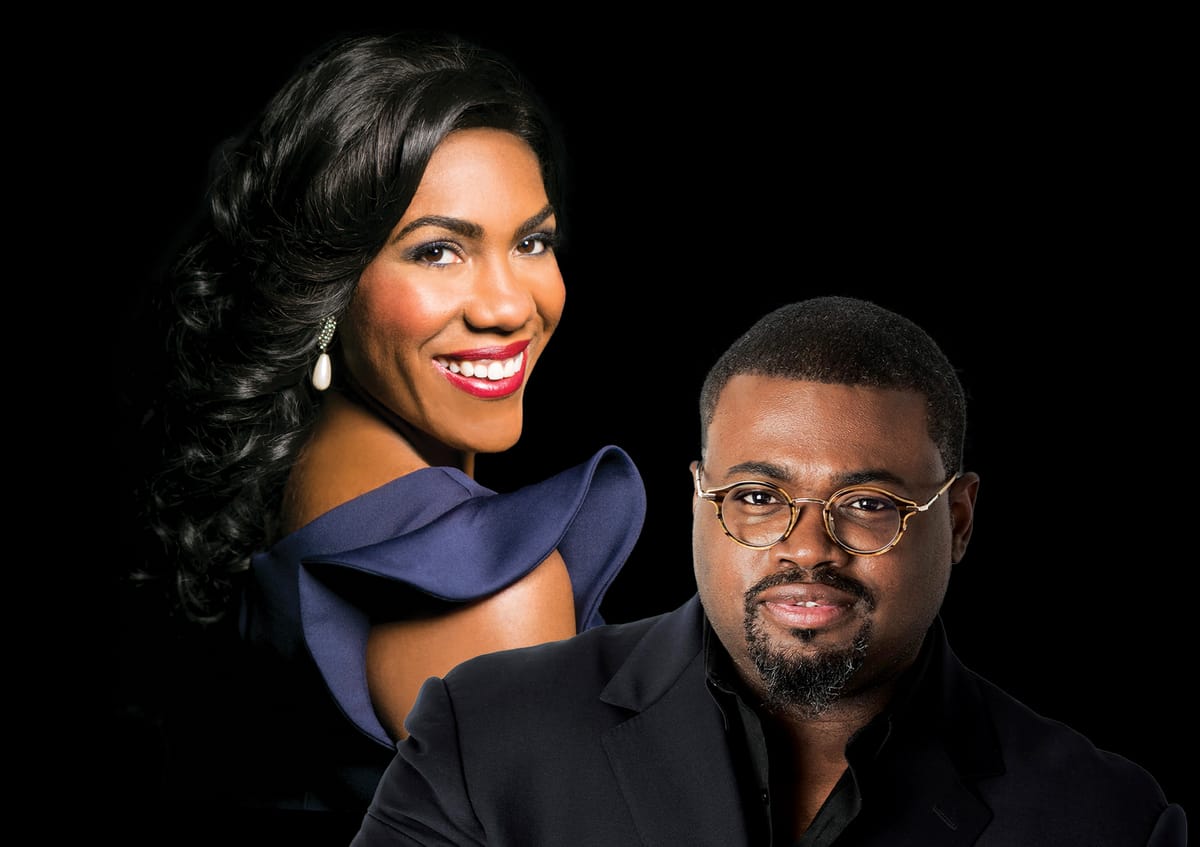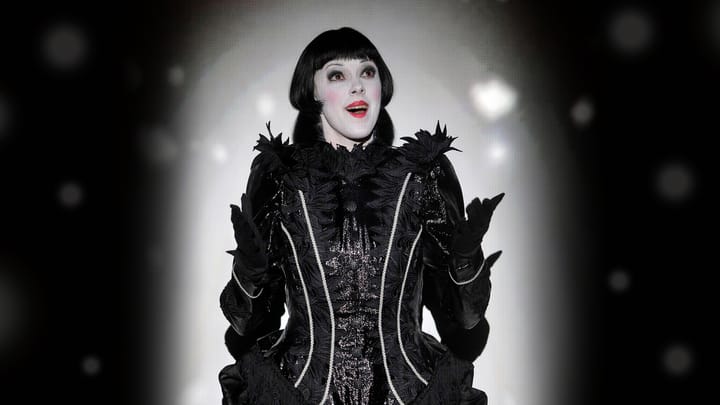January 17 & 19 | McCaw Hall
In This Program
- Show Information
- Who’s Who
- Letters
- Features
- Additional Information
Les Troyens in Concert
Production Sponsors
Principal Singer Season Sponsor
Joan Watjen
in Memory of Craig M. Watjen
Production Sponsors
Artsfund
ArtsWA
Artist Sponsors
Anne M. Redman
Russell Thomas "Aeneas"
Dr. Michael P. Thiesen
J'nai Bridges "Dido"
We are deeply grateful to you, Seattle Opera’s 4,100+ Annual Fund donors. Your passion for opera and contributions at every dollar amount inspire great performances in McCaw Hall and support engaging activities at The Opera Center and throughout Washington State all season long!
Thank you!
Music by Hector Berlioz
Libretto by the composer, after Virgil’s Aeneid
Premiere: As Berlioz conceived it performed in one evening, Cologne, Germany, 1898
Seattle Opera Premiere: January 2025
Performed at the Marion Oliver McCaw Hall: January 17 & 19
Evening Performance: 7:30 PM
Matinee: 2:00 PM
Act I: 57 minutes
Intermission 25 minutes
Act II: 68 minutes
In French with English captions
CONDUCTOR
Ludovic Morlot
DIRECTOR
Anderson Nunnelley
LIGHTING DESIGNER
Robert Aguilar
WIGS, HAIR, & MAKEUP MANAGER & DESIGNER
Ashlee Naegle
CHORUS MASTER
Michaella Calzaretta
ENGLISH CAPTIONS
Jonathan Dean
Cast
(in order of appearance)
DIDO (DIDON)
J’Nai Bridges
ANNA
Kelley O’Connor †
IOPAS
John Matthew Myers †
AENEAS (ÉNÉE)
Russell Thomas
NARBAL
Adam Lau
ASCANIUS (ASCAGNE)
Tess Altiveros
PANTHOUS (PANTHÉE)
Andrew Potter
MERCURY (MERCURE)/GHOST OF PRIAM
Richard L. Hodges
ASSISTANT CONDUCTOR
Phillip A. Kelsey
MUSIC PREPARATION
Philip A. Kelsey
David McDade
Jay Rozendaal
PRODUCTION STAGE MANAGER
Jonathan Moore †
ASSISTANT STAGE MANAGERS
Cristine Reynolds
Bret Torbeck
† Seattle Opera mainstage debut
Opera presentation and production © Seattle Opera 2025. Copying of any performance by camera, audio, or video recording equipment, and by any other copying device, and any other use of such copying devices during the performance is prohibited.
The Story
Prelude: The Founding of Carthage. After her husband Sychaeus was murdered, Queen Dido fled Tyre with her sister Anna and her followers. Upon reaching the shores of North Africa, Dido was confronted by King Iarbas, who granted her only as much land as a single oxhide could cover.
Dido and Anna cut the hide into thin strips, weaving it into string to encircle a large area by the sea. There, they founded Carthage—a thriving city born of ingenuity and resolve.
Dido’s palace in Carthage. A rapturous chorus salutes Queen Dido. The people swear to protect Dido against King Iarbas, who has demanded her hand in marriage and now threatens to invade their territory.
Dido’s sister Anna thinks Dido needs love in her life once more. But Dido, who fondly remembers the murdered Sychaeus, feels conflicted and intends to stay single.
A foreign fleet, battered by a storm, seeks refuge in the harbor. The Trojan march is heard; Ascanius, son of Aeneas, speaks on behalf of the refugees, who are fleeing the destruction of their city, Troy. Dido welcomes them. At that moment Narbal enters in distress: Iarbas’ army has advanced into their territory and is threatening Carthage. Instantly Aeneas steps forward from among the Trojans and offers to repel Dido’s enemies. Enthusiastically she accepts his help, and he marches out to defend Carthage.
Royal Hunt and Storm. In a forest outside Carthage, a storm looms on the horizon. Returning from the hunt, Dido and Aeneas seek shelter in a cave as lightning splits the sky. The storm’s fury ignites their passion, and they consummate their love, with nature bearing witness.
Dido’s gardens by the sea. Narbal confides to Anna his fear that Dido, distracted by Aeneas, is neglecting affairs of state. Anna explains that Dido loves Aeneas. Anna hopes that love, the most powerful of all the gods, will bring Dido strength through a new partnership with Aeneas.
INTERMISSION
Iopas, the court poet, sings the praises of the goddess Ceres. Dido asks Aeneas to continue the story of the fate of Troy. What happened to Andromache? Aeneas explains that in the end Hector’s widow married her captor Pyrrhus. Ascanius quietly removes Dido’s wedding ring (from her first marriage). To Anna, the boy resembles Cupid—a reminder of love’s irresistible power.
Dido and Aeneas, alone in the garden, sing the duet “Nuit d’ivresse et d’extase infinie.” But despite their love for one another, the god Mercury reminds Aeneas his destiny is to move on from Carthage and found a mighty empire: “Italie!”
The harbor at night. Trojan ships are lying at anchor. Panthous and the Trojan chiefs prepare the fleet’s departure; every moment wasted brings closer the wrath of the gods.
Aeneas, torn between his love for Dido and his god-mandated duty to save his people and found the Roman empire, sings the aria “Inutiles regrets.” Ghosts from Troy order him to follow his destiny. His mind made up, he orders the Trojans to their boats. Dido, her heart breaking, begs Aeneas to stay with her. But as the sound of the Trojan march is heard, Aeneas boards his ship.
In Dido’s Palace. Dido tries to persuade Anna to go to the harbor to intercede for her. Anna says Aeneas still loves Dido, even though his responsibilities compel him to leave her. Dido says love would compel her to disobey the powerful god Jupiter himself. As the ships set out to sea, Dido bursts out in fury, ordering the Carthaginians to pursue and destroy the traitorous Trojans. Only one thing is left to her: to raise an awful pyre to the gods of the underworld, and on it to burn everything that was ever connected with Aeneas. Left alone, Dido plans her own death. In the aria “Adieu, fière cité,” she bids farewell to Carthage, a city born from her vision and labor, a city that will endure as a testament to her strength and spirit.
A terrace overlooking the sea. A funeral pyre is presided over by priests of Pluto. Dido mounts the pyre, takes Aeneas’ sword, prophesies that one day her people will produce a warrior, Hannibal, who will avenge Carthage on Rome. Then she plunges the sword into her breast. But in a vision, Dido sees Rome triumphant. She dies as the Carthaginians howl curses at the Trojans. But the “Trojan March” contradicts them, and a vision of Eternal Rome rises behind Dido’s pyre.
Who’s Who
Artists

ROBERT AGUILAR
Lighting Designer (Sunnyside, WA)
Seattle Opera Debut: Lighting Designer, Orpheus and Eurydice (’22)
Engagements: The Skin of Our Teeth, Fat Ham, Laughs in Spanish
(Seattle Rep); Mary Poppins, Something’s Afoot, Waitress (The 5th Avenue Theatre); The Hobbit, A Christmas Story (Pittsburgh Public Theater); Beautiful, Once on This Island (Village Theatre); Waitress, In the Heights (Theatre Under the Stars); Golden (ACT Contemporary Theatre)

TESS ALTIVEROS
Ascanius (Ascagne)
Soprano (Seattle, WA)
Seattle Opera Debut: Clorinda, The Combat (’17)
Previously at Seattle Opera: Nana/Market Woman #1/Wajma, A Thousand Splendid Suns (’23); Giannetta, The Elixir of Love (’21, ’22); Female Soldier, The Falling and the Rising (’19)
Engagements: Soloist, Missa solemnis (Boulder Philharmonic); Soloist, Cinco Poemas de Vinicius de Moraes (Greenville Symphony); Mimì, La bohème (Intermountain Opera); Susanna, The Marriage of Figaro (Opera Idaho); Soldier, The Falling and the Rising (Des Moines Metro Opera, Arizona Opera, Intermountain Opera, Opera Memphis)

J’NAI BRIDGES
Dido (Didon)
Mezzo-soprano (Tacoma, WA)
Seattle Opera Debut: Delilah, Samson and Delilah in Concert (’23)
Engagements: Lucinda, Intelligence (Houston Grand Opera); Soloist, Stabat Mater (New York Philharmonic); Mezzo-Soprano, El Niño, Nefertiti, Akhnaten (Metropolitan Opera); Carmen, Carmen (Hamburg State Opera, Arena di Verona, Dutch National Opera, Canadian Opera Company, Lyric Opera of Chicago, Teatro Lirico di Cagliari); Soloist, Still and Negrón with Gustavo Dudamel (Los Angeles Philharmonic)

MICHAELLA CALZARETTA
Chorus Master (Muscatine, IA)
Seattle Opera Debut: The Elixir of Love (’22)
Acclaimed for her high standards and superb preparation skills, Calzaretta oversees all musical activities at the company and prepares the chorus for mainstage productions. Last season, the chorus embarked on their immensely successful, first-ever tour to Mt. Vernon and Vashon Island. Recent praise includes “Her chorus was one of the stars... the voices were radiant” (Bachtrack) and “... the singers are both zesty and accurate (they’re also extremely nimble)” (The Seattle Times). Calzaretta is a doctoral candidate in choral conducting at Indiana University.
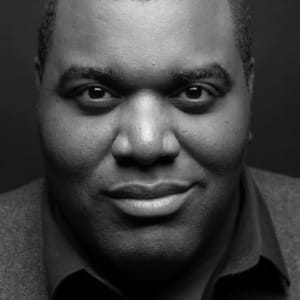
RICHARD L. HODGES
Mercury (Mercure)/Ghost of Priam
Baritone (Greensboro, NC)
Seattle Opera Debut: Friend/Ensemble, X: The Life and Times of Malcolm X (’24)
Engagements: Ensemble, X: The Life and Times of Malcolm X (Metropolitan Opera); Friend/Ensemble, X: The Life and Times of Malcolm X (Detroit Opera); Lawyer Frazier/Undertaker, Porgy and Bess (Greensboro Opera Company); Preacher, Sweet Land (The Industry LA); William Still, Sanctuary Road (Chautauqua Symphony Orchestra); Director of Voice Studies, Western Washington University

ADAM LAU
Narbal
Bass (San Francisco, CA)
Seattle Opera Debut: Papa and Makoto Kobayashi, An American Dream (’15)
Previously at Seattle Opera: Soloist, 60th Anniversary Concert & Gala (’24); Angelotti, Tosca (’21); Masetto, Don Giovanni (’21)
Engagements: Colline, La bohème (Opera Philadelphia); Dr. Grenvil, La traviata (Metropolitan Opera); Sarastro, The Magic Flute (Ravinia Festival); Soloist, Verdi’s Requiem (Carnegie Hall); Figaro, The Marriage of Figaro (Utah Opera); Sam, Un Ballo in Maschera (San Francisco Opera)

LUDOVIC MORLOT
Conductor (Lyon, France)
Seattle Opera Debut: Beatrice and Benedict (’18)
Previously at Seattle Opera: Das Rheingold (’23); Samson and Delilah in Concert (’23); Welcome Back Concert: Die Walküre (’21)
Engagements: Music Director (Barcelona Symphony Orchestra); Conductor Emeritus (Seattle Symphony); Associate Artist (BBC Philharmonic); Guest Conductor (Philadelphia Orchestra, Los Angeles Philharmonic, San Francisco Symphony, Danish National Symphony)
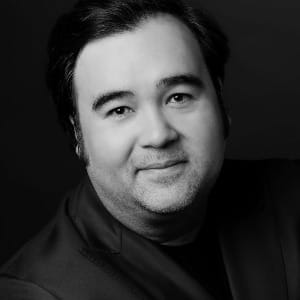
JOHN MATTHEW MYERS
Iopas
Tenor (Lake Forest, CA)
Seattle Opera Debut
Engagements: Mao Tse-Tung, Nixon in China (Opera National de Paris); Mario Cavardossi, Tosca (Arizona Opera); Froh, Das Rheingold, Waldemar, Gurrelieder (Los Angeles Philharmonic); Bacchus, Ariadne auf Naxos (Teatro La Venice, Opernhaus Zürich)

ASHLEE NAEGLE
Wigs, Hair, and Makeup Manager & Designer (Las Vegas, NV)
Seattle Opera Debut: Hair and Makeup Intern, Giulio Cesare (’07)
Ashlee Naegle made a name for herself early on in her career by mastering the dying art of wig building. She created and designed for several companies around town until Seattle Opera created an in-house Hair and Makeup Designer position for her in 2017. During her time as the in-house Hair and Makeup Designer, she has built a sizable wig collection, built a department, and set high standards for wigs, hair and makeup. With each production, her designs are custom built for the performers and their characters to create a believable façade for the audience and to complement the costumes and production as a whole.

ANDERSON NUNNELLEY
Director (Traverse City, MI)
Seattle Opera Debut: Charlie Parker’s Yardbird (’20)
Previously at Seattle Opera: Assistant Director, Alcina (’23); Associate Stage Director, A Thousand Splendid Suns (’23); Assistant Director, Blue (’22)
Artistic Administration Intern: 2012/13
Engagements: Associate Director, El Relicario de los Animales (Long Beach Opera), Nacht Ohne Morgen (Staatsoper Berlin, Opéra Comique); Madame Butterfly (Opera Pittsburgh, Opera Utah); Assistant Director, Madame Butterfly (LA Opera, Boston Lyric Opera); Rigoletto, Pelléas et Mélisande, (Santa Fe Opera); LA Opera Staging Staff 2025/26

KELLEY O’CONNOR
Anna
Mezzo-soprano (Clovis, CA)
Seattle Opera Debut
Engagements: Soloist, Mahler’s Third Symphony (San Francisco Symphony); Mahler’s Second Symphony (Kansas City Symphony Orchestra); Neruda Songs (Aspen Music Festival); Recitalist, Kelley O’Connor & Robert Spano in Recital (Detroit Chamber Music Society); Soloist, America: A Prophecy (Gewandhaus Orchester, Cleveland Orchestra); Verdi’s Requiem (Colorado Symphony)

ANDREW POTTER
Panthous (Panthée)
Bass (Mansfield, OH)
Seattle Opera Debut: Abimelech, Samson and Delilah in Concert (’23)
Previously at Seattle Opera: Mullah/Sharif/Soldier, A Thousand Splendid Suns (’23)
Engagements: Harašta, The Cunning Little Vixen (Detroit Opera); Colline, La bohème (Pacific Symphony); Quince, A Midsummer Night’s Dream (The Atlanta Opera); Ferrando, Il trovatore (Opera Santa Barbara); Angelotti, Tosca (Dallas Opera); Vodnik, Rusalka (Portland Opera)
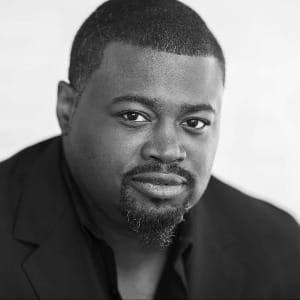
RUSSELL THOMAS
Aeneas (Énée)
Tenor (Miami, FL)
Seattle Opera Debut: Foresto, Attila (’11)
Previously at Seattle Opera: Ismaele, Nabucco (’15); Hoffmann, The Tales of Hoffmann (’14)
Seattle Opera Young Artist: 2002/03
Engagements: Kaiser, Die Frau ohne Schatten (Metropolitan Opera); Florestan, Fidelio, Radames, Aida (Lyric Opera of Chicago); Cavaradossi, Tosca (Royal Opera House Covent Garden); Calaf, Turandot (LA Opera)
CHORUS
Soprano
Clarice Alfonso
Gemma Balinbin
Brandi Birdsong
Jennifer Campbell
Karen Early Evans
Sarah Fletcher
Dana Johnson Robbins
Ellaina Lewis
Linda Mattos
Ibidunni Ojikutu
Eleanor Stallcop-Horrox
Shelly Traverse
Amy Van Mechelen
Lyndee White
Eliza Woodyard
Alto
Lorraine Burdick
Erica Convery
Anneliese Floyd
Sarah Larkworthy
Sara Litchfield
Madison Lombardo
YeonSoo Lee
Myah Rose Paden
Dawn Padula
Elizabeth Peterson
Melissa Plagemann
Bianca Raso
Carmen Souza
Heidi Vanderford
Lucy Weber
Tenor
Callum Alden
Hugh Davis
Andrew Etherington
Kenneth Foster
James Galbraith
Kimani Iba
Tim Janecke
Eric Angus Jeffords
Ian Loney
Carson Lott
Jacob Malpocker
Korland Simmons
Jon Suek
Brendan Tuohy
Stephen Wall
Bass
Mark Davies
Craig Garretson
Craig Grayson
Glenn Guhr
Bertram Gulhaugen
Zachary Martin
James Mayclin
Terence Mejos
Michael Monnikendam
Micah Parker
Will Schlott
Jonah Spool
Revere Taylor
Isaiah Utto-Galarneau
Robin Wyatt-Stone
Orchestra
Violin I
Helen Kim, Concertmaster
Emerson Millar, Asst. Concertmaster
Jennifer Bai
Timothy Garland
Leonid Keylin
Ji Yeon Lee
Wayne Lee
Andy Liang
Mikhail Shmidt
John Weller
Jeannie Wells Yablonsky
Ilana Zaks
Caitlin Kelley
Victoria Parker
Violin II
Cameron Daly, Principal
Kathleen Boyer, Asst. Principal
Evan Anderson
Natasha Bazhanov
Brittany Breeden
Stephen Bryant
Xiao-po Fei
Artur Girsky
Seunghoon Lee
Andrew Yeung
Elizabeth Phelps
Tamas Kocis
Viola
Mara Gearman, Principal
Timothy Hale, Asst. Principal
Wesley Dyring
Gerald Liu
Ursula Steele
Daniel Stone
Mitso Floor
Kayleigh Miller
Camille Ripple
Marta Lambert
Cello
Nathan Chan, Principal
Eric Han, Asst. Principal
Sunnat Ibragimov
David Sabee
Charles Jacot
Jake Hanegan
Emily Hu
Page Smith
Double Bass
Jordan Anderson, Principal
Will Langlie-Miletich, Asst. Principal
Sam Casseday
Jennifer Godfrey
Travis Gore
Todd Larsen
Flute
Jeffrey Barker, Principal
Bridget Pei
Zartouhi Dombourian-Eby
Piccolo
Zartouhi Dombourian-Eby
Oboe
Mary Lynch VanderKolk, Principal
Stefan Farkas
Clarinet
Benjamin Lulich, Principal
Eric Jacobs
Bassoon
Seth Krimsky, Principal
Paul Rafanelli
Kipras Mažeika
Brittany Harington
Horn
Jeffrey Fair, Principal
Jenna Breen
John Turman
Danielle Kuhlmann
Trumpet
David Gordon, Principal
Christopher Stingle
Alexander White
Sarah Viens
Trombone
Ko-ichiro Yamamoto, Principal
Carson Keeble
Eden Garza
Tuba
John DiCesare, Principal
Timpani
Eric Schweikert, Principal
Percussion
Michael Werner, Principal
Jonathan Wisner
Matt Decker
Harp
Valerie Muzzolini, Principal
Alexis Colner
Personnel Manager
Constance Aguocha
Assistant Personnel Manager
Keith Higgins
Rotating members of the string section are listed alphabetically.
Letters
From the General & Artistic Director

It is my pleasure to welcome you to our concert production of Hector Berlioz’s Les Troyens, a masterpiece so massive in scale that all five acts are rarely performed in the same evening. In our abridged edition, you’ll experience the most memorable moments of this grand French epic, including Dido’s and Aeneas’s passionate love duet “Nuit d’ivresse et d’extase infinie” as well as Dido’s heartbreaking aria “Adieu, fière cité.”
Not widely considered an opera composer because of his numerous symphonic works, especially the Symphonie fantastique, Berlioz did indeed write highly acclaimed operas, including Benvenuto Cellini, Beatrice and Benedict, and, of course, Les Troyens.
Such an opera as Les Troyens requires exceptional talent, and we are deeply fortunate to welcome two outstanding artists back to McCaw Hall. J’Nai Bridges, the remarkable mezzo-soprano and Tacoma native, impressed everyone in her debut performance as Delilah in 2023. And tenor Russell Thomas launched his career here as a Young Artist and sang in Nabucco (’15) and The Tales of Hoffmann (’14). Les Troyens is equally demanding on the orchestra. Tonight, we’ll shine a spotlight on 80 world-class musicians from the Seattle Symphony, placing them right in the middle of the action. We are deeply fortunate to be in partnership with this great musical institution. Les Troyens also showcases our 60-voice chorus.
What’s more, we are lucky to have maestro Ludovic Morlot conducting. Ludovic, having grown up near Berlioz’s birthplace at La Côte-Saint-André, France, has a deep appreciation and understanding of the composer. As a child, Ludovic visited the composer’s home (now a museum) multiple times.
With artistic excellence as the centerpiece, this is your opportunity to immerse yourself completely in the music. Les Troyens is a rare treat, to say the least. So, I invite you to absorb the tremendous beauty of this tour de force.
Thankfully,
James Robinson
General and Artistic Director
From the President
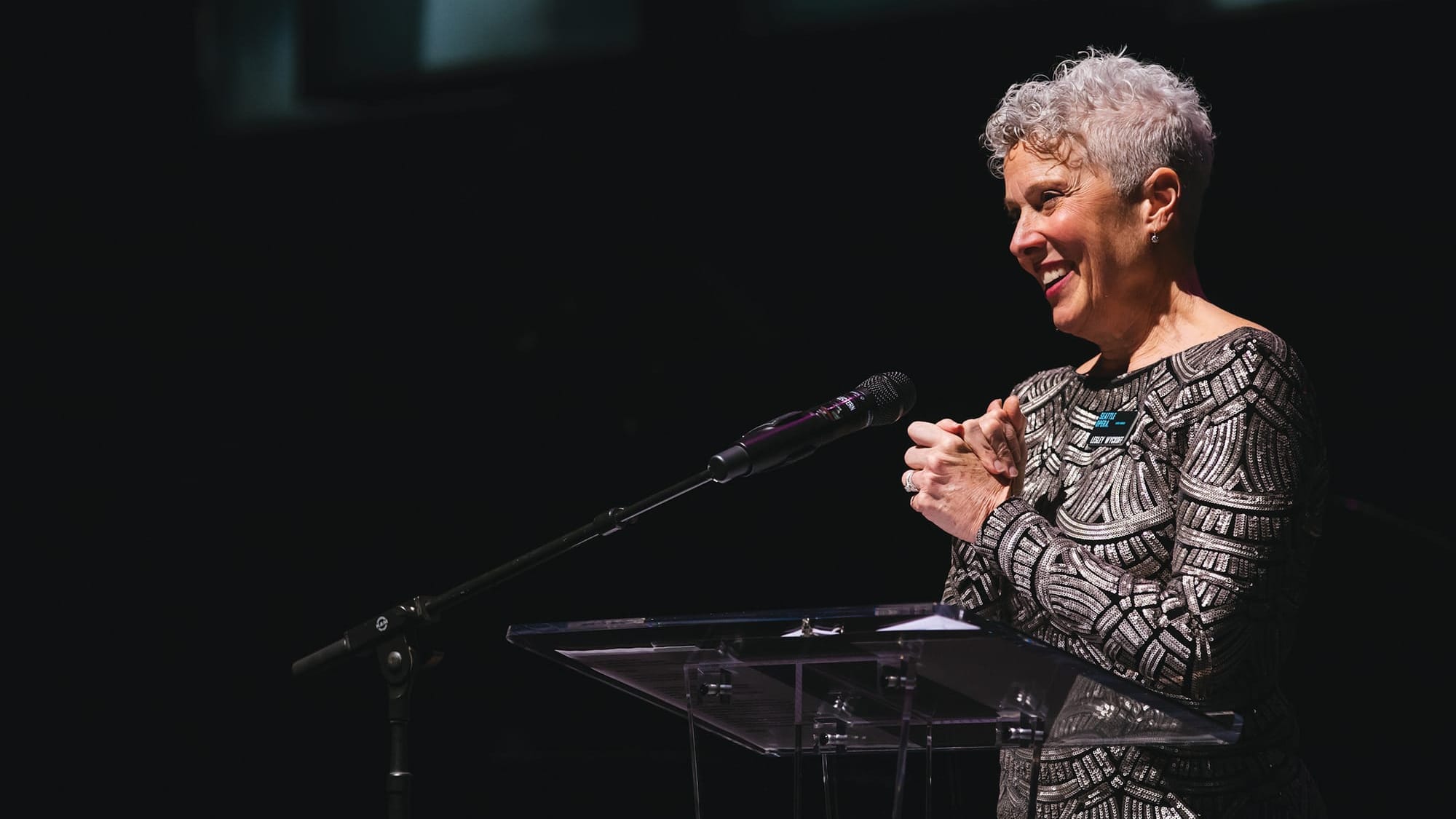
Welcome to 2025 and Seattle Opera’s Les Troyens in Concert!
There’s so much to be excited about in 2025!
First of all, you are here tonight to kick off the year with this concert version of Les Troyens, never before seen or heard in Seattle. We all know that fully-staged operas are captivating. Who is not moved by the poignance of Tosca’s aria “Vissi d’arte,” or enchanted by Papageno and Papagena’s duet in The Magic Flute? But the opportunity to relish the sheer virtuosity of voice and instrumentation in a concert version of opera, especially a rare gem like Berlioz’s Les Troyens, is riveting. We get to marinate in sheer musicality! The Grammy Award-winning Seattle Symphony, led by favorite Ludovic Morlot conducting the French repertory that is his specialty, right on the stage with our brilliant vocalists—it’s a surfeit of musical riches!
If you are a subscriber, thank you and bravo to you for the foresight that allows you to experience rare gems like Les Troyens in Concert. If you are not yet a subscriber, there are two more blockbuster operas to come: Tosca and The Magic Flute (which just may be one of the best operas ever to which to bring friends of all ages). Subscriptions ensure early access and can be customized to include all offerings, including those beyond the mainstage at McCaw Hall, like the recently sold-out A Very Drunken Christmas Carol holiday show and the upcoming Freddie Ballentine and Kunal Lahiry recital, both presented in the intimacy of Tagney Jones Hall in the Opera Center next door.
And very soon, you will be able to sign up for either all, or your choice of some, of the magical productions we’re presenting next season. Our new General and Artistic Director, James Robinson, has been working hard to begin his tenure with a thrilling inaugural season. There will be both new and traditional productions, new formats, and new venues. There will be plenty of ways for you and your friends to experience opera: special theme nights, Family Days, and so much more. Every performance will be invigorating and fresh.
Frankly, it’s just about all I can do to hold myself back from previewing the season in this letter! But trust me, you won’t want to miss a thing. Watch your mail and email for the announcement of Seattle Opera’s 2025/2026 season, coming in the next few weeks.
Sign up early to get the very best seats.
But this evening, savor Les Troyens in Concert!
Lesley Chapin Wyckoff, President
Seattle Opera Board of Directors
The Power and Passion of the Queen
By Jonathan Dean
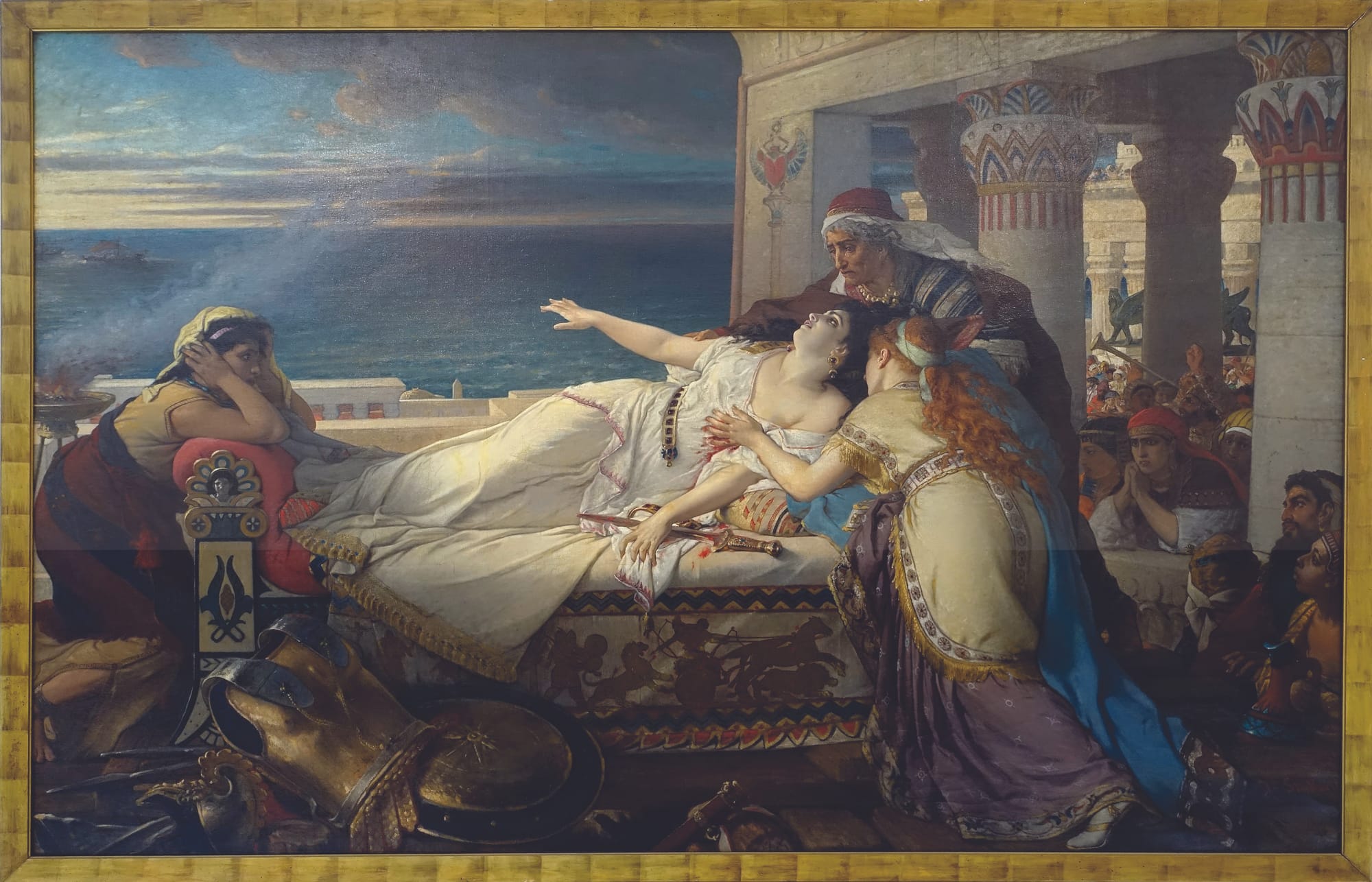
What drove Hector Berlioz to write the impossibly ambitious and magnificent Les Troyens? This work of a lifetime owes something of its genesis to three powerful women—one fictional, two real—who played important roles in the life of nineteenth-century France’s most unique composer.
A QUEEN OF MYTH AND SORROW
Berlioz was first moved and troubled by Dido, the legendary queen who founded Carthage, as a child, when his father was teaching him Latin. According to the composer’s memoirs, “It was Virgil who had found the way to my heart and opened my budding imagination, by speaking to me of epic passions for which instinct had prepared me.” Translating the scene in which Dido kills herself on the funeral pyre, surrounded by Aeneas’ effects, young Berlioz was so overcome “my lips trembled and the words came with difficulty…I was confused and embarrassed by such emotion.” His father, sensing the lad’s fragile state, closed the book, saying, “‘That will do, my boy. I’m tired.’” Intense emotions experienced in childhood have staying power, and for Berlioz, nothing could ever compare with the greatness, the nobility, and the tragedy of Queen Dido.
A PRINCESS AND ARTS PATRON
Decades later, when Berlioz was in his 50s, the urging of a powerful woman finally convinced him to write Les Troyens. It was Princess Carolyn zu Sayn Wittgenstein, a Polish noblewoman best known for her 40-year relationship with Franz Liszt, who pushed Berlioz to compose his enormous epic. He had told the princess of his idea for “a vast opera on the Shakespearean plan based on the second and fourth books of The Aeneid.” But Berlioz, by now familiar with the excruciating difficulties of getting his music performed to his satisfaction, worried that creating a work of such magnitude would only bring “miseries.”
At first, according to Berlioz’s memoirs, Sayn-Wittgenstein tried encouragement: “‘Your passion for Shakespeare combined with this love of classical antiquity would be sure to produce something new and splendid…You must tackle it, and you must finish it.’”
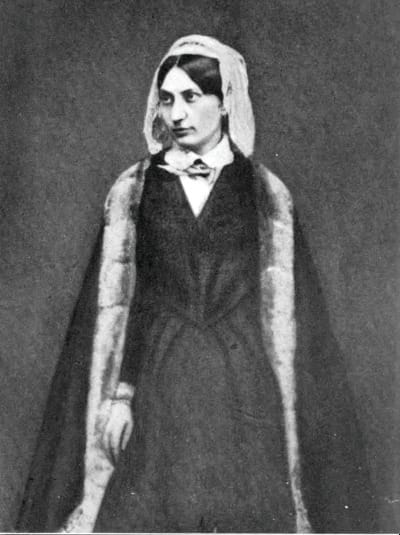
But he continued to object, whereupon the princess turned to threats. “‘Listen,’ she said, ‘if you shrink from the difficulties this work may and must bring you, if you are so feeble as to be afraid…never come back here—I refuse to see you again.’”
The queen commands! Scholars have suggested that Sayn-Wittgenstein encouraged Berlioz because she was nonplussed by and suspicious of Liszt’s close friend (and future son-in-law) Richard Wagner, then at work on his monumental Der Ring des Nibelungen. Berlioz and Wagner became friends, of a sort, perhaps even influenced each other, although they pursued strikingly different aesthetic goals. In his operas, Wagner used music to tell the story; but he never had the goal of writing beautiful music for its own sake. As for Berlioz, his goal was to express human passion—the passion that had so overwhelmed him in Virgil’s poetry and Shakespeare’s theater—in music.
AN INSPIRING MUSE AND UNHAPPY WIFE
But let’s back up. The complex emotions of Act 5, when Aeneas ends his impossibile relationship with Dido, resonate with all the grief and guilt Berlioz experienced upon the death of his first wife, two years before he began writing Les Troyens.
She was Harriet Smithson, an Irish actress who first came to Paris in 1827 with a traveling English theater company. Their performances introduced literary France to Shakespeare for the first time. Romantics such as Victor Hugo and Berlioz caught the Shakespeare bug. (Berlioz’s obsession with the English bard would inspire much of his greatest music, including overtures on King Lear and The Tempest, the dramatic symphony Roméo et Juliette, and the opera Béatrice et Bénédict.)
But Berlioz also became obsessed with Smithson, who played Juliet and Ophelia. In 1830, his Symphonie fantastique—music about an artist’s obsession with a beautiful woman—caught her attention, along with that of the rest of Paris. In 1833, she married him. Big mistake. At first, she was famous and popular, the talk of Paris, and he was nobody. But as his star rose, her career and health withered. She never forgave him. She grew bitter and possessive. Her death in 1854 left the composer a sadder and wiser man.
By now, Berlioz had the skill—and, perhaps, the need—to express all his grand, Shakespearean passions in music. The powerful, irresistible love of Dido and Aeneas he expresses obliquely, in both the wild “Royal Hunt and Storm” pantomime sequence and the gorgeous “Nuit d’ivresse” duet—its text swiped from Shakespeare’s Merchant of Venice since Virgil didn’t give Berlioz anything even close to the words of a love duet. Berlioz carefully depicts Dido yearning for love, but reluctant to make herself vulnerable, in her first duet with Anna. Then, despite her better judgement, Dido feels herself falling for Aeneas, bringing forward all the conflicted passions that had shaken Berlioz as a boy learning Latin.

As for Aeneas, Berlioz characterizes him not as a thoughtless, B. F. Pinkerton-esque cad, but as a genuinely caring, heroic person who truly believes fate has doomed him to unhappiness. Tormented by a parade of ghosts from his past (like many of Shakespeare’s tragic heroes), Aeneas feels himself forced to betray Dido despite his overwhelming love for her. In the end, he leaves for Italy, just as broken by their doomed affair as she is.
Did Berlioz see himself as Aeneas and Smithson as Dido? A glorious queen shows grace to a sad wretch, and despite obvious obstacles, an intimacy develops. But he prioritizes his duty, his career, his glory over their shared destiny, and she ends up being sacrificed. Leaving us where, in the end? Dido curses Aeneas and Rome, and imagines that the Punic Wars will bring her vengeance; but the “Trojan March,” representing Aeneas’ piety and duty, has the opera’s final word.
Similarly, if Harriet Smithson is remembered today at all, it’s because of the music she inspired in Berlioz. But perhaps serving as a muse, an inspiration, can itself be a worthy fate.
Upcoming Events
YOUTH OPERA PROJECT: ROBIN HOOD
The Opera Center
January 31–February 2
Youth 18 & Under: $10, Adults: $20; 1 Flex Pass Credit
Embark on an exciting adventure through the Sherwood Forest in this year’s Youth Opera Project production of Robin Hood. The outlaw who steals from the rich to give to the poor and his Merry Band battle against the evil Sheriff of Nottingham and his loyal henchmen, and learn that by working together, they can save the community they call home. Based on the classic legend with music by Ben Moore and libretto by Kelley Rourke. seattleopera.org/robinhood
THE MAGIC FLUTE ARTISTS IN RECITAL
The Opera Center
Friday, February 7 at 7:30 PM
$34 Subscribers; $39 General Public; 1 Flex Pass Credit
Join cast members of The Magic Flute Brandie Sutton (La bohème ’21), who is singing the role of Pamina, and Victor Robinson (Seattle Opera Debut), who is singing the role of Tamino, for an evening of songs, arias, and more. seattleopera.org/fluterecital
AN IMMERSIVE SEMINAR: THE MAGIC FLUTE
The Opera Center
Tuesdays, beginning January 28 at 6:30 PM
$150 Sliding Scale Free or 1 Flex Pass Credit
The Magic Flute is many different things: a delightful kids’ show, a dated bundle of offensive clichés, a new myth for the Age of Enlightenment, an inspiration to all artists and dreamers, and, not to forget, some of the most sublime music ever written. Discover this beloved opera with others who want to consider it in detail. The seminar will carefully guide you through the libretto, score, and cultural context, and consider uses and abuses of The Magic Flute since 1791. seattleopera.org/fluteseminar
OPERA TALK: FORGING A NEW PATH WITH JAMES ROBINSON
The Opera Center
Thursday, February 13 at 7:00 PM
Free
Get to know Seattle Opera’s newest General & Artistic Director James Robinson, who joins us after a celebrated career as one of the nation’s most sought-after operatic stage directors. He also served as Artistic Director of Opera Theatre of St. Louis, where he championed new works and presented imaginative new productions of the core repertoire. Hear about his plans to bring a similar innovative spirit to Seattle, starting with our 2025/26 season, as well as his ideas to guide Seattle Opera through the challenges of the post-pandemic era. seattleopera.org/newpath
RESIDENT ARTISTS IN RECITAL
The Opera Center
Friday, March 21 at 7:30 PM
$34 Subscribers; $39 General Public; 1 Flex Pass Credit
Our Resident Artists Michael J. Hawk, baritone, and Tiffany Townsend, soprano, are featured in this intimate recital. Tiffany is a graduate of LA Opera’s Young Artist Program, and has appeared recently with LA Opera, Wolf Trap Opera, and Long Beach Opera. For Seattle Opera, she had covered Nedda in Pagliacci and will cover Floria Tosca in Tosca. She also performed the role of America Robinson in Jubilee.
Michael is also a graduate of LA Opera’s Young Artist Program, and his recent schedule has included appearances with LA Opera, Santa Fe Opera, and the Buffalo Philharmonic. At Seattle Opera, he has performed in the, 60th Anniversary Concert & Gala and Pagliacci, and will perform in The Magic Flute. seattleopera.org/residentartistrecital
OPERA CLASS: OPERA & POLITICS
Online Via Zoom Webinar
Tuesdays, April 15–May 20 at 6:30 PM
$150 Sliding Scale Fee or 1 Flex Pass Credit
Instructor: Lokela Alexander Minami,
Associate Director of Community Engagement
Discover how opera, from the Baroque era to the present, reflected and shaped the political environments of its time, harnessing its ability to inspire, educate, and unite audiences to become a powerful medium for the expression of political ideas and cultural values. seattleopera.org/operapolitics
Print Edition
